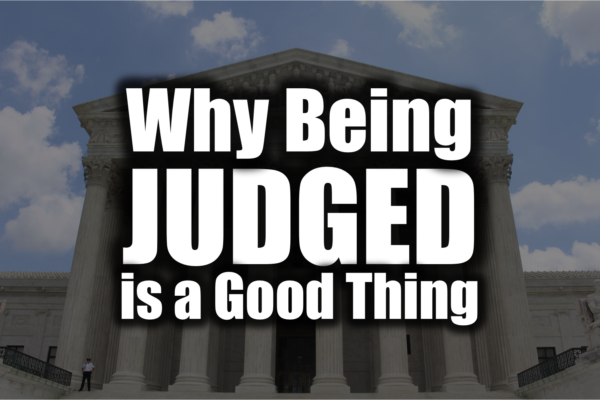It’s safe to say that in today’s culture we, as a people, hate the idea of being judged. Anytime even the hint of judgment is felt you’ll typically hear a barrage of statements like:
- “You can’t judge me.”
- “No one can judge me but God.”
- “Doesn’t the Bible say ‘Judge not that ye be not judged?’”
- “What right do you have to judge me?”
- “Why do you have to be so judgmental?”
- “The world would be such a better place if we would love each other instead of judging one another.”
- “Who do you think you are to judge me?”
- Ad nauseum…
Needless to say, most people don’t like the idea of their actions being judged by another. I’m not sure there is anything that can infuriate some people faster. But why? I’m not convinced that being judged is a bad thing. Instead, I believe judgment is something that we should appreciate and embrace and I think when we take an honest look at it you will too.
What Does the Bible Say About Judgment?
Is it true that judgment is always wrong all the time? You might be surprised to hear that the answer to that question is “no.” Now, what is true is that Jesus condemned a particular type of judgment, but not judgment as a whole.
In Matthew 7:1 Jesus did say to “judge not, that ye be not judged.” However, while many people stop there the conversation about judgment actually extends a bit further. In verse 2 Jesus gave a warning about judging like we would want to be judged and in verses 3-5 He went on to say that our most severe judgment should be directed toward ourselves. However, even implied in these verses, regarded as Jesus’ only words on the matter, is the reality and need for judgment among us.
But contrary to popular belief, the first few verses of Matthew 7 weren’t all Jesus ever had to say about judgment. Later in the very same chapter Jesus would go on to talk about judging a tree by its fruit as a metaphor for the way we should righteously judge each other (vs. 16-20). In John 7 Jesus condemned the Pharisees, not because they were judging someone for their actions, but because of the way they were judging someone for their actions; and in the midst of that conversation Jesus said this – “Judge not according to appearance, but judge righteous judgment” (John 7:24). Jesus actually told us to judge one another, but just to make sure that we judge based on substance and not just appearance.
In fact, it’s the height of ignorance to say that we should never judge under any circumstances. If we can’t judge one another then at the same time we can’t perform some of our most basic functions as Christians:
- How can we know who to trust and not trust with our spiritual direction (1 John 4:1)?
- How can we know when to confront the guilty for their sins (Matthew 18:15-17; 1 Corinthians 5:1ff)?
- How can we know who to mark and avoid (Romans 16:17)?
- How can we warn others about wolves among us (2 John 9-11)?
- How can we know when we have Diotrophes type people around us (3 John 9-10)?
- How can we know who is in need of being saved from death (James 5:19-20)?
And to take it even a step further, if we can’t Biblically judge the evil in one another’s lives does that mean we can’t judge what’s good either? We never hear anybody condemn judgment when a person is being praised for their good works, only when they are being confronted for their mistakes and sins.
So essentially what I’m saying is that the idea of not being able to judge one another under any circumstance is unbiblical, unsustainable, and something in which it is impossible to be consistent.
So, Why Should I Consider Being Judged a Good Thing?
Simply put, the reality of being judged, not only by God, but by our fellow man gives us two things that we desperately need: expectation and accountability. Most people don’t like being judged because it implies that there is a standard they are supposed to be living by and they don’t like the idea of a standard to which they will be held accountable. But expectation and accountability are not things we should hate and reject, but things that we should love and embrace. God’s expectation is what’s best for us here and eternally, and accountability by our friends, family, and brethren keeps us in the boundaries of those expectations walking in the light and enjoying fellowship with God and His people (1 John 1:7) so that we can look forward to eternity with hope.
Judgment, when administered properly, is an act of love. It’s a statement by those around us that says we aren’t doing what’s right and they love us enough to confront us about it so we can make the necessary corrections to be better. So when we find ourselves in the seat of the judge or the judged let’s remember what its purpose is and how it can and should enhance our lives.
-Andy
Photo by Claire Anderson on Unsplash

